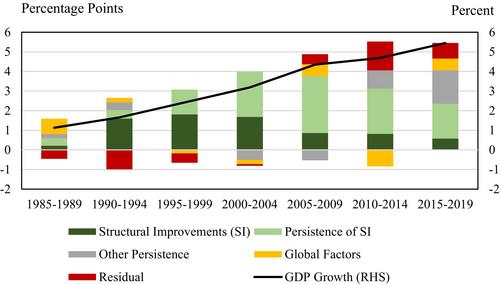Good enough for outstanding growth: The experience of Bangladesh in comparative perspective
Abstract
Motivation
Bangladesh's economic growth rate over the past three decades has been one of the highest in the world. This success is difficult to reconcile with a single macroeconomic explanation of development.
Purpose
Previous studies have investigated individual aspects that can explain Bangladesh's successful development. But a consistent account of how individual factors contributed to growth is currently missing. Can factors that correlate with growth in other countries explain the outstanding growth performance of Bangladesh? Or is the country's experience unique?
Methods and approach
We construct a panel data set for 149 countries since 1970 and combine growth regression techniques with a peer group comparison. Different specifications, subsamples, and estimation techniques are considered.
Findings
Factors correlating with growth in other countries can well explain the growth experience of Bangladesh. But two features are specific to the country. First, a combination of “good enough” policies led to considerable growth impulses between 1990 and 2005: the country's improvements in typical correlates of growth during this period were among the global top 5% for any 15-year period investigated. Second, despite the absence of major reforms after 2005, Bangladesh defied the mean reversion in growth rates experienced by most fast-growing economies and peer countries.
Policy implications
Our results support the idea that a combination of “good enough” policies can jump-start high growth in low-income countries. Our findings further demonstrate that a stable macroeconomic and institutional environment helps when it comes to reaping the benefits of structural improvements in the long run.


 求助内容:
求助内容: 应助结果提醒方式:
应助结果提醒方式:


